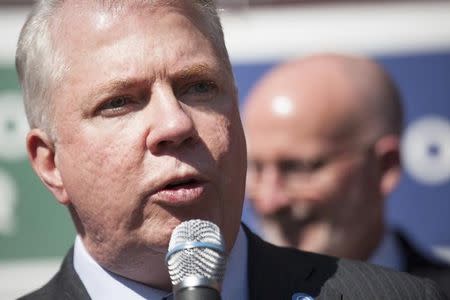Seattle mayor proposes developer fees to pay for affordable housing

By Eric M. Johnson SEATTLE (Reuters) - Seattle's mayor unveiled an affordable housing plan on Tuesday aimed at creating 20,000 new living units for low-income city dwellers over the next decade, more than a quarter of them to be paid for by private developers. Mayor Ed Murray said his proposal was aimed at addressing an overheated real estate market, fueled in part by the growth of Seattle-based Internet retailer Amazon.com and other companies, that is pricing out low- and middle-income residents. Affordable housing has emerged as a top political issue ahead of fall elections in Seattle, a city of 650,000 residents. Housing has been hotly debated, especially in gentrifying neighborhoods where residents bemoan - or flee - soaring rents and the tearing down of Craftsman-style homes for modern multifamily buildings. A lack of affordable housing, combined with stagnant or falling wages, has been cited by experts as a key contributing factor to homelessness in a number of U.S. cities. "This is a conversation about building an equitable Seattle, where those who work, that struggle economically - those who just struggle, period - can live in this city," Murray told reporters. The plan requires City Council approval. Murray hopes to add 20,000 units of affordable housing over 10 years, 6,000 of which would be paid for by private residential and commercial developers. Murray's plan would impose a special fee on commercial developments ranging from $5 to $17 per square foot, based on a building's size and location. It also would require up to 8 percent of multifamily dwellings be set aside for residents earning no more than 60 percent of the area's median income - $37,680 for an individual or $53,760 for a family of four. Alternatively, developers could pay a fee to help finance off-site affordable housing. The Real Estate Investors Association of Washington said looser zoning and permitting among other building incentives - as opposed to mandates and fees - would bring higher inventory and lower prices. "Six-thousand units in 10 years? I don't believe the 6,000 units would address the needs we have now," association President Shirley Henderson said. Investment firm Vulcan Inc, which led the transformation of Seattle's South Lake Union neighborhood where Amazon is based, has already contributed $9.6 million toward affordable housing in exchange for additional height and density allowances, "evidence that a program that links fees to additional development capacity clearly works," said Lori Mason Curran, a director at the firm. (Reporting by Eric M. Johnson; Editing by Steve Gorman and Eric Beech)

 Yahoo News
Yahoo News 